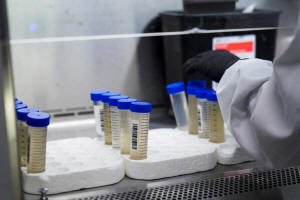Countries ponder wider wastewater testing amid hope airports offer China
COVID-19 clues
 Send a link to a friend
Send a link to a friend
 [January 11, 2023]
By Jennifer Rigby [January 11, 2023]
By Jennifer Rigby
LONDON (Reuters) - An international meeting this week will discuss
setting up a global system of wastewater monitoring for COVID-19,
including at airports, after several countries said they would start
tests on flights coming from China.
Countries including the United States and Australia have moved to set up
wastewater testing on flights and in airports amid a surge of cases in
China. The European Union also recommends a similar measure and has
drawn up guidelines for member states.
Numerous studies have shown that such testing has been effective for
tracking COVID-19 during the course of the pandemic, particularly when
combined with genomic sequencing techniques to identify emerging
variants.
One expert said the measure was useful when countries either will not,
or lack the capacity to provide information on the circulating variants
causing surges in COVID-19 cases in their territories.
"It lights a candle in the darkness," Bernd Gawlik, who co-authored the
EU guidelines as the lead on water quality at the European Commission,
told Reuters.

[to top of second column]
|

A lab technician tests wastewater
samples from around the United States for the coronavirus disease
(COVID-19) at the Biobot Analytics, in Cambridge, Massachusetts,
U.S., February 22, 2022. REUTERS/Allison Dinner
 The talks are part of a broader push
to keep up momentum on wastewater sampling and bring together
national efforts into a more cohesive global picture.
It is also becoming more important as routine testing has waned -
the World Health Organization says testing for COVID-19 has declined
by 90% in recent months.
There are hopes that establishing a more formal wastewater
surveillance network worldwide could provide information not only on
COVID-19, but also on other emerging disease threats.
However, there are technical and logistical challenges ahead, Gawlik
said, including how to handle samples and how to interpret and use
the information gathered.
(Reporting by Jennifer Rigby; Editing by Tomasz Janowski)
[© 2023 Thomson Reuters. All rights
reserved.]This material may not be published,
broadcast, rewritten or redistributed.
Thompson Reuters is solely responsible for this content. |